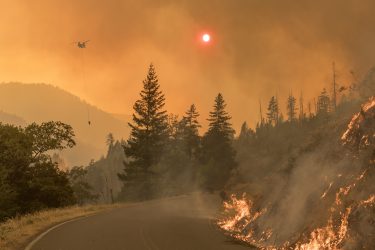
Environmental disasters in the U.S. often hit minority groups the hardest.
When Hurricane Katrina slammed New Orleans in 2005, the city’s black residents were disproportionately affected. Their neighborhoods were located in the low-lying, less-protected areas of the city, and many people lacked the resources to evacuate safely. Similar patterns have played out during hurricanes and tropical storms ever since.
Massive wildfires, which may be getting more intense due to climate change and a long history of fire-suppression policies, also have strikingly unequal effects on minority communities, a new study shows.
Researchers at the University of Washington’s School of Environmental and Forest Sciences and The Nature Conservancy used census data to develop a “vulnerability index” to assess wildfire risk in communities across the U.S. Their results, appearing Nov. 2 in the journal PLOS ONE, show that racial and ethnic minorities face greater vulnerability to wildfires compared with primarily white communities. In particular, Native Americans are six times more likely than other groups to live in areas most prone to wildfires.
Read more at UW Today »
